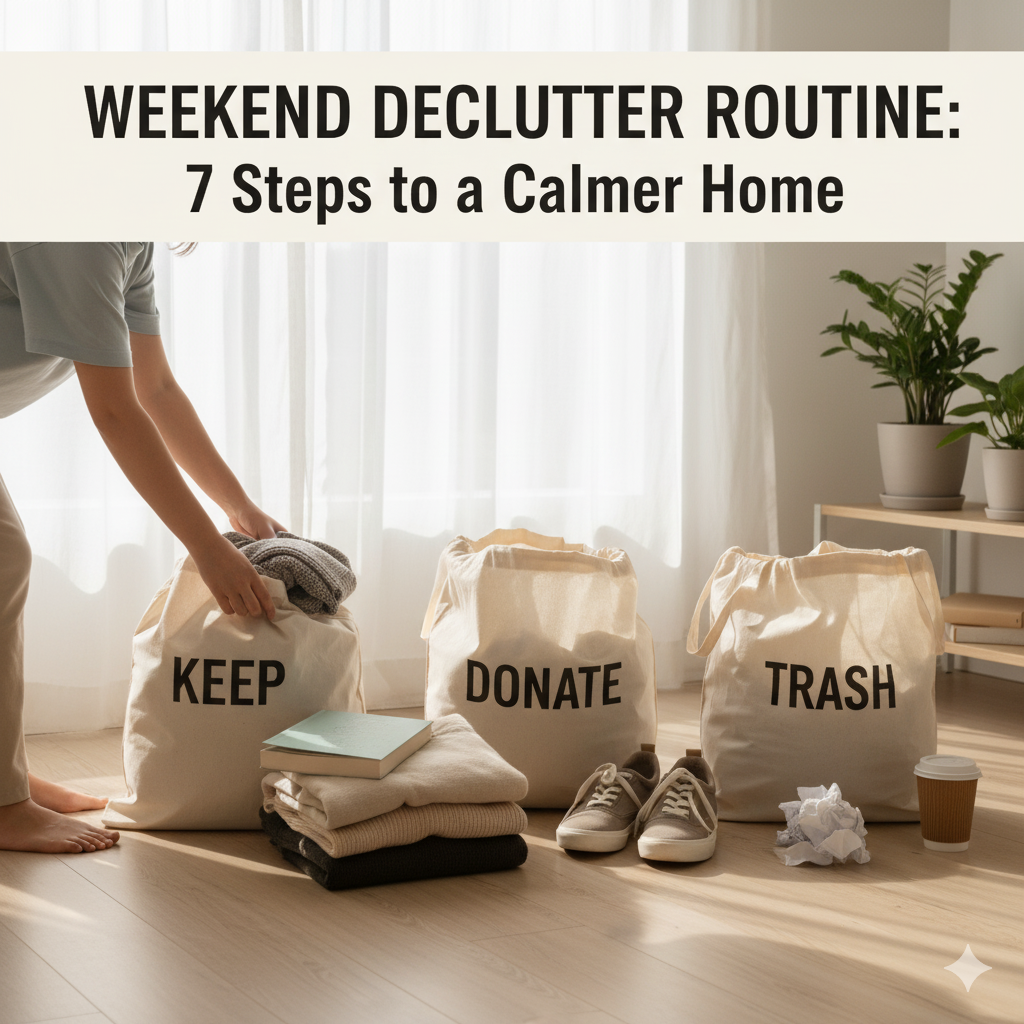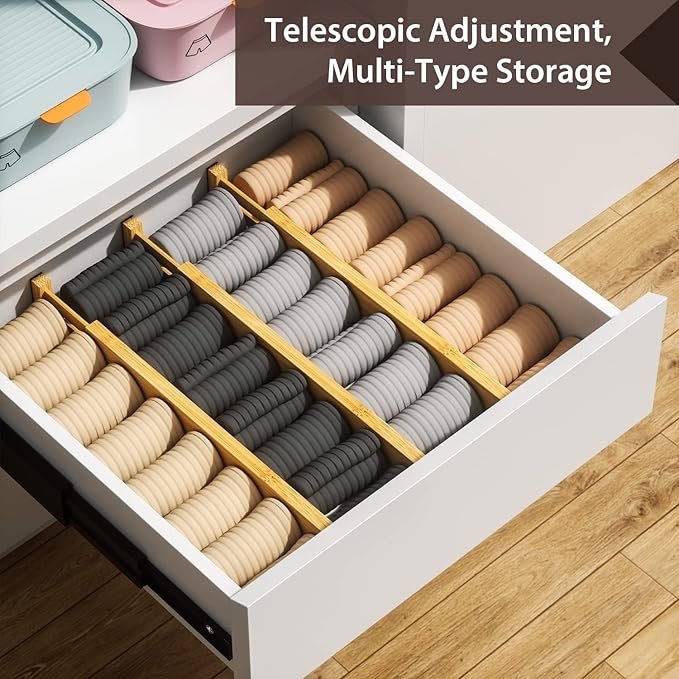The Clutter Conundrum: Why Your Weekend Needs a Declutter Routine
Hey there, fellow routine-unplugger! 👋
Ever walk into a room, glance at a pile of stuff, and feel an instant wave of stress? You’re not alone. Our homes, the places meant for rest and refuge, often become silent battlegrounds against accumulating clutter.
It starts subtly: a stack of mail here, an extra gadget there, clothes that might fit again one day. Before you know it, your physical space feels jammed, and your mental space feels even worse.
That fuzzy, overwhelmed feeling? That’s clutter’s sneaky way of stealing your peace and clarity.
The good news? You don’t need to become a minimalist overnight, nor do you need to spend your entire life decluttering. What you do need is a strategy. A simple, repeatable, and effective plan to reclaim your space.
Enter the Weekend Declutter Routine.
This isn’t about perfectly organized cupboards (though that’s a nice bonus!). It’s about regularly clearing out the noise so you can genuinely relax, recharge, and focus on what truly matters to you.
Ready to transform your weekend from chaotic to calm? Let’s dive into 7 powerful steps to establish your ultimate Weekend Declutter Routine.

Step 1: The Pre-Declutter Pep Talk (Shift Your Mindset)
Before you even think about grabbing a trash bag, stop. Your first step in any Weekend Declutter Routine is purely mental.
Clutter isn’t just “stuff”; it’s often tied to emotions, guilt, or aspirational versions of ourselves. Acknowledge this is a psychological process, not just a cleaning task.
Tell yourself: “This isn’t about getting rid of everything, it’s about making space for what I truly value.” Be kind, be realistic, and be firm with yourself. This positive, non-judgmental mindset is your most powerful tool.
Remind yourself of the why: a calmer home, less decision fatigue, more freedom. This pep talk sets the stage for success and reduces the emotional friction of letting go.
Step 2: Choose Your Declutter Zone (Keep it Small to Win Big!)
The biggest mistake people make? Trying to declutter their entire house in one weekend. Hello, burnout and instant defeat!
For your Weekend Declutter Routine, pick ONE, small, manageable zone. Seriously. Just one.
Think: a single junk drawer, the shelf above your desk, one kitchen cabinet, or your bedside table. A zone you know you can complete in 30 to 60 minutes.
By choosing a small zone, you guarantee a win. This builds momentum and prevents the paralyzing feeling of overwhelm. You’ll be amazed at the positive impact even a tiny decluttered space can have on your mood and productivity.
Step 3: The “Everything Out” Rule (See What You Really Have)
Alright, you’ve got your zone. Now, the magic begins. Take everything out of that designated space. Yes, every single item!
Spread it out on a bed, a table, or the floor. The goal here is to visually confront exactly what you own.
This step might feel a little chaotic for a moment, but it’s crucial. Often, we don’t realize how much we’ve accumulated until it’s all staring back at us. This visual inventory is eye-opening and forces honest decision-making.
Step 4: The Three-Pile Power Play (Decide with Purpose)
With everything laid out, it’s decision time. Create three clear piles—and grab large bags or boxes for them:
- Keep: Items you genuinely use, love, and need. These have a clear, dedicated home.
- Donate/Sell: Items that are still useful and in good shape but no longer serve you. They deserve a new life elsewhere.
- Trash/Recycle: Broken items, expired goods (especially in the kitchen/bathroom), and things beyond repair or use. Be ruthless here.
Ask yourself two key questions for every item: “Have I used this in the last year?” and “Does this item contribute to the quality of my life right now?” If the answer to both is no, it belongs in pile two or three.

Step 5: Clean, Organize, Contain (The “New Home” Process)
Before putting anything back, give your newly emptied space a good, thorough clean. Wipe it down, vacuum, and make it shine. This step signals a genuine fresh start to your brain and increases the satisfaction of the job.
Now, for the “Keep” pile. Every item needs a designated home. If it doesn’t have one, it’s just clutter waiting to happen.
Invest in simple organizing tools: drawer dividers, small bins, or clear containers. These aren’t just for aesthetics; they help maintain order. The goal is to make it incredibly easy to put things away—easier than putting them down.
Step 6: The Immediate Exit Strategy (No Piles Allowed!)
This step is non-negotiable for a successful Weekend Declutter Routine: The “Donate/Sell” and “Trash/Recycle” piles must leave your house by the end of the weekend.
Do not let them linger. Those bags and boxes will only become new forms of clutter, undermining all your hard work and creating decision fatigue.
Take the trash out immediately. Put the donate box in your car right away, ready for its trip to the charity shop. This swift, final action creates a tangible sense of completion and lasting success.
Step 7: Reflect, Enjoy, and Plan (Cementing Your Routine)
You did it! Take a moment to stand back and admire your newly decluttered, clean space. Feel that lightness? That’s mental clarity in action.
Enjoy this feeling! This positive reinforcement is key to making your Weekend Declutter Routine a long-term habit.
Finally, while basking in your success, quickly plan your next small zone for next weekend. Jot it down. This tiny bit of planning ensures continuity and keeps the momentum going without letting it feel like a chore.
Deep Dive: The Mental & Emotional Benefits of Decluttering
The impact of clutter is far more than just visual. It takes a severe toll on your cognitive and emotional health, which is why a Weekend Declutter Routine is so crucial for an unplugged life.
When your home is cluttered, your brain is constantly processing multiple stimuli. This leads to decision fatigue and increased levels of the stress hormone cortisol. Studies show a direct link between visual chaos and elevated stress.
By implementing a declutter routine, you actively reduce the noise. This allows your prefrontal cortex (the part of your brain responsible for focus and decision-making) to rest. The result? Sharper focus, improved mood, and a dramatic reduction in anxiety.
A decluttering session isn’t just cleaning; it’s self-care. It restores a sense of control and competence in your life, leading to greater peace and a feeling of genuine relaxation—the kind that screens simply cannot offer. Your calm home becomes the incubator for your calm mind.
Common Decluttering Roadblocks & How to Overcome Them
Even with the best routine, you’ll hit roadblocks. Knowing how to navigate them is key to maintaining your consistency.
The Sentimental Trap: We all have items tied to memories. Instead of keeping everything, choose one or two items to represent an entire collection, and take a photo of the rest. That photo preserves the memory without sacrificing the space.
The “What If I Need It Later?” Guilt: This is paralyzing. Use the “Maybe Box” rule. Place items you’re unsure about in a labeled box, seal it, and store it for six months. If you don’t open the box in that time, donate it unopened. You clearly didn’t need it.
Procrastination: Often, we avoid decluttering because we see it as a huge, all-day chore. Set a timer for 20 minutes. Focus intensely until the timer goes off. You’ll be surprised how much you accomplish and how often you want to keep going once you start.
Guilt Over Money Spent: Don’t let past spending dictate your present space. The money is gone. Keeping the item out of guilt only costs you peace and space. Repurpose, sell, or donate it to minimize the waste and maximize your well-being.
Maintaining Your Clutter-Free Sanctuary: Daily Habits
Your Weekend Declutter Routine provides the reset, but daily habits provide the maintenance. A little bit every day beats an all-day purge every month.
Master the “5-Minute Tidy.” Before you sit down to relax, spend five minutes quickly putting away items that are out of place in your immediate area. It’s a tiny investment with huge returns.
Handle the Mail immediately. Process it over the trash can: sort, file, or shred right away. Don’t let mail pile up on a counter—that’s Clutter HQ.
Implement a Nightly Reset. Before going to bed, take one last walk through the main living areas. Put blankets away, reset the sofa pillows, clear flat surfaces. Waking up to a tidy space dramatically improves the start of your day.
If you bring a new item into the house, commit to the “One-In, One-Out” Rule. For every new shirt, book, or gadget you acquire, one similar item must leave the house. This practice maintains equilibrium.
Beyond Physical Clutter: Digital Decluttering (Bonus Step!)
As a key component of an unplugged routine, don’t forget your digital life also needs a routine declutter. Digital clutter is just as taxing on your mental resources.
Dedicate 15 minutes each weekend to organizing your files and clearing your desktop. A clean desktop is the digital equivalent of a clean counter.
Unsubscribe Ruthlessly. If you get emails you don’t read, hit that unsubscribe button. Reduce the daily stream of digital demands.
Manage Your Apps. Delete any apps you haven’t used in a month. They clog up your phone and create constant, unnecessary visual reminders.
By clearing your physical and digital space simultaneously, you create a holistic environment for true mental clarity and peace.
Customizing Your Weekend Declutter Routine: Making It Yours
Remember, consistency trumps intensity. Your Weekend Declutter Routine should support your life, not stress it.
Be flexible. Not every weekend needs two hours of work. If you have a busy Saturday, just tackle a single drawer for 15 minutes. The goal is to keep the streak going.
Make it enjoyable. Put on your favorite upbeat music, light a candle, or listen to an engaging podcast. Creating a pleasant atmosphere makes the task feel less like a chore and more like intentional self-care.
Involve the family. If you live with others, assign small, specific, and manageable zones to each person. Decluttering is a shared responsibility, and a tidy common area benefits everyone.
Conclusion: Your Path to a Lighter, Calmer Life
Congratulations! You now have a clear, actionable plan to tackle clutter and reclaim your peace. Your Weekend Declutter Routine isn’t just about tidying up; it’s about investing in your mental well-being, reducing stress, and making more space for the things that truly nourish your soul.
Remember, a clutter-free home isn’t a destination; it’s a journey. But with these 7 simple steps, you’ve got a powerful compass to guide you. Every item you thoughtfully remove, every drawer you organize, creates more room for clarity, creativity, and calm in your life.
By embracing this routine, you are choosing an unplugged life—a life where your attention is not constantly diverted by the noise of unwanted stuff.
Are you ready to embrace a lighter, calmer home and mind?
Take Step 1 this weekend: Choose ONE small zone in your home. Before you touch anything, take a moment for that pre-declutter pep talk. Acknowledge your intention.
Then, share your first decluttering victory with us! What small zone did you tackle, and how did it make you feel? Tell us in the comments below! Let’s inspire each other to unplug from the chaos and plug into peace. 🌟